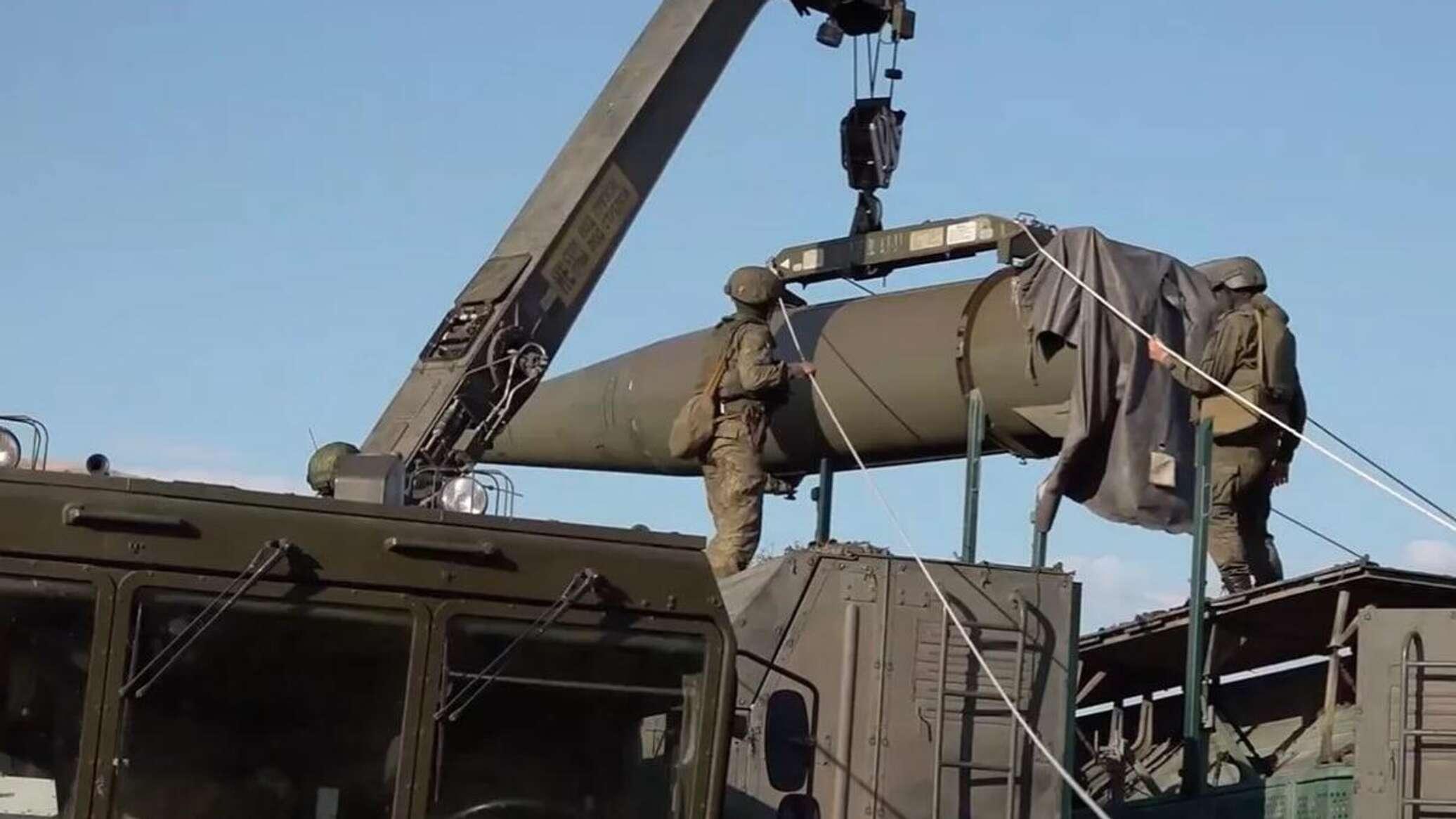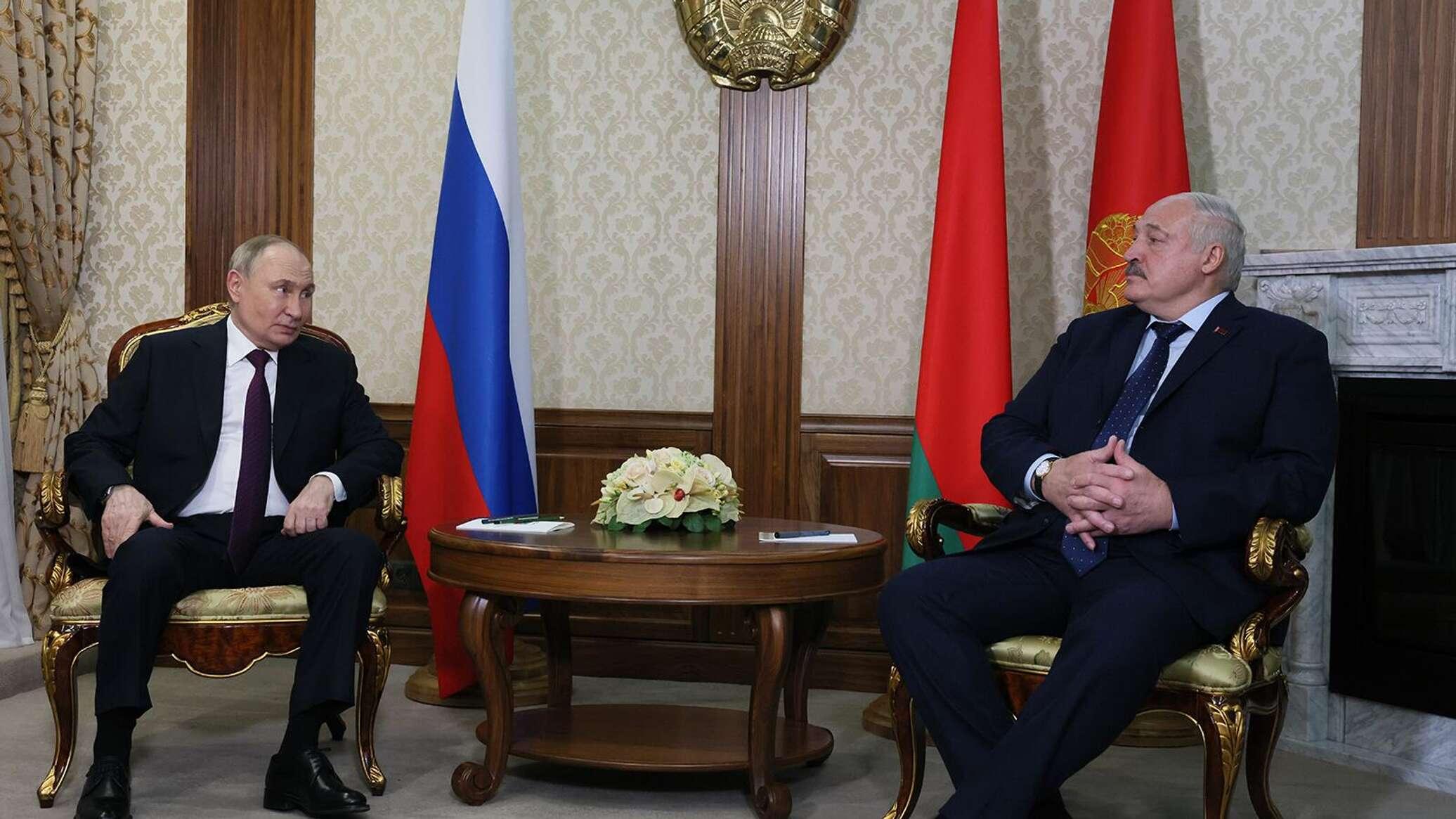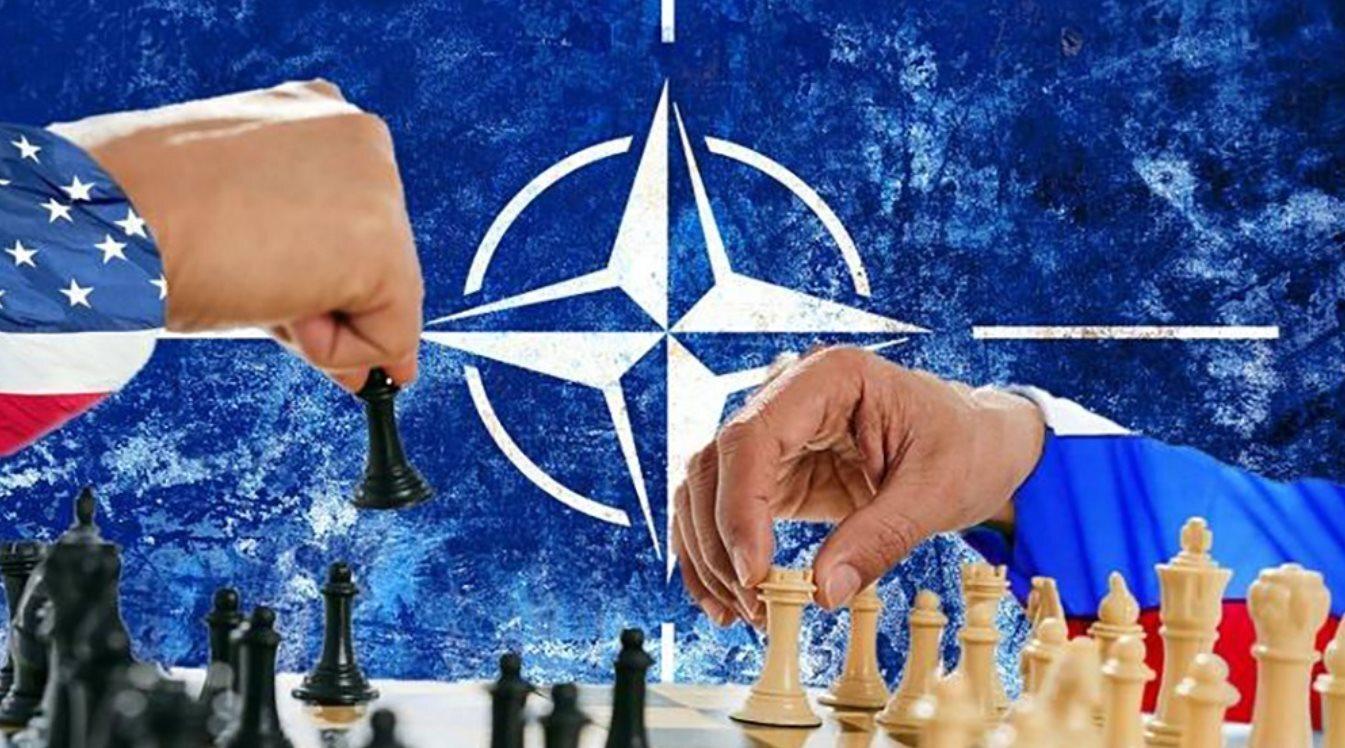Baltic tensions surge as Russia, NATO escalate military posturing
Border clarifications and nuclear drills
ANALYTICS 27 May 2024 - 13:09
| Serhey Bohdan Caliber.Az |
The Russian Defence Ministry this week announced its intention to "clarify" the borders in the Baltic Sea. And it has launched exercises to practice the use of tactical nuclear weapons, which will gradually shift toward the Baltic. All this is against the backdrop of attempts by a number of NATO-EU countries to restrict Russian land transit to Kaliningrad and turn the Baltic Sea into a "NATO internal sea."
The stakes are rising. On May 24, NATO Secretary General Stoltenberg already firmly stated that Ukraine has the right to use the Western weaponry handed over to it to strike Russian territory. The very geopolitical configuration of Eastern Europe has in fact already been programmed by external players to collide, with the countries of the region no longer able to get out of this dangerous spiral on their own. Unlike the South Caucasus, Eastern Europe has become a mere geographical concept, having lost its political subjectivity and ability to decide its own fate.
Hot summer of 2024 or a proposal for a "treaty"?
On Tuesday, the Russian Defence Ministry published information on a draft decree of the Russian government that would "update" the coordinates of the state border in Russia's territorial waters in the Baltic Sea. The authors of this document point out that the current coordinates were approved in 1985 and do not correspond to the "modern geographical situation." In particular, "the straight baselines in the Gulf of Finland have no continuation and do not close to the territory of the Russian Federation, which, in turn, makes it impossible to determine the external boundary of the internal sea waters".
"Direct baselines" are supposed to be established both in the eastern part of the Gulf of Finland and in the Kaliningrad region. Of the entire draft document, only its justification has been made public, neither the text itself nor the new coordinates of the state border points are included in it. Formally, the document is on public discussion until next weekend. And the new legal act should come into force in January 2025.

Due to all of the aforementioned, the publication itself looked like a kind of warning to the West with a hint of readiness for a "deal". In addition, the very next day the information about the document on border changes disappeared from the federal portal. And Russian presidential spokesman Dmitry Peskov announced that there was no political component in the Defence Ministry's project. But already on Thursday, Russian authorities began to take practical steps in this regard. They removed some of the border buoys on the Narva River, which separates Russia from Estonia. The European External Action Service demanded that the buoys be put back in place to delimit territorial waters and shipping lanes.
This is unlikely to be the end of the matter. After all, in recent years the EU-NATO countries have repeatedly voiced plans to paralyze the Russian Baltic Fleet and, consequently, to establish NATO control over the Baltic. They also talked about actually changing the borders of the sea waters controlled by NATO countries.
In particular, in 2022, Estonian Defence Minister Hanno Pevkur said that the missile defence system being created by Estonia and Finland would make it possible to "close" the Gulf of Finland, which is used for shipping to St. Petersburg and Kronstadt, to Russian ships. And last year, the Estonian government invited its agencies to "develop a position" on the introduction of a "contiguous zone" of 44.4 kilometers.
This would allow NATO to inspect ships traveling to and from Russian ports, potentially barring their passage through the narrow and shallow Gulf of Finland. In other words, Tallinn began to probe the idea of closing the Baltic "window to Europe" to Russia. However, the move was considered too risky at the time and soon began to backfire in the media and then in politics.
The Swedes are ready to attack
New Russian threats to revise borders in the Baltic Sea have naturally worried neighboring states. The Finnish on Wednesday cautiously said that the state borders could be revised due to changes in natural conditions that affect the boundaries of economic areas. But, they say, they should act under the 1982 UN Convention on the Law of the Sea, not in a notification procedure. The Finnish can be understood - they have a long border with the Russian Federation, which they have already closed, but they have nothing to cover it with. A serious confrontation with Russia requires a multiple increase in military expenditures, including reorganization of the army in accordance with NATO requirements, introduction and maintenance of foreign troops on their territory, and deployment of nuclear weapons. All this cannot be done quickly.
The Swedes - who have no border with Russia - responded much more harshly on the same day. Commander-in-Chief of the Swedish Armed Forces, Mikael Büden said that Russia plans to seize the Swedish island of Gotland and possibly the Åland Islands to take control of the Baltic. Therefore, the Swedish army is once again "massively arming" Gotland, deploying additional units on it in addition to the main forces. Büden separately emphasized the readiness to use the island for an offensive operation.
Gotland lies just opposite the Kaliningrad region, so the question of where such an operation could be directed goes away by itself. Militarization of this island leads to the emergence of not just an unsinkable aircraft carrier, but a real checkpoint on the way between Kaliningrad and the rest of Russia, putting into question sea and air communication with the enclave. Given that Lithuania is making a case for limited and unsustainable land transit to Kaliningrad, the situation poses a credible threat to the Russian Federation and Moscow could behave very harshly.
Practicing a regional apocalypse
And the escalation has already begun. All the risky strategic gestures were made this week against the backdrop of Russian exercises practicing the use of tactical nuclear weapons. They began on the day they announced their intentions to "clarify borders," on May 21. The maneuvers themselves were announced back in early May. At the first stage, they are taking place far from the Baltic - in the southern military district of the Russian Federation, near the borders of Ukraine.
But at the next stage - the exact date is still unknown - Belarus should join the maneuvers. Belarus does not directly face the Baltic Sea, but it has always historically been primarily a Baltic country. On May 23-24, Lukashenko and Putin discussed these exercises in Minsk to practice the use of non-strategic nuclear weapons.
However, back on May 7, simultaneously with the official announcement of the planned Russian exercises, President Lukashenko ordered a "surprise test" of tactical nuclear weapons in Belarus. According to Defence Minister Viktor Khrenin, a division of the Iskander operational-tactical missile system and a squadron of attack aircraft were involved at that time. The test included "the entire range of activities from planning, preparation and use of strikes with tactical nuclear warheads," including the delivery of nuclear warheads to the troops, their loading onto launchers and suspension on Su-25s.
Russian tactical nuclear weapons were deployed in Belarus last year. There remains deliberate ambiguity about who controls them and who will decide on their use. The Russian media only quote military pensioners on this subject, bravely assuring the imperial audience that, say, Russia will not give anything to anyone.
However, the very deployment of tactical nuclear weapons in Belarus was already oriented more toward Belarusian strategic needs. Lukashenko also said something like that on May 24 after his meeting with Putin, when he was asked about the exercises on its use. He said there were 90,000 NATO and Ukrainian military personnel stationed on the border with Belarus: "I wonder what the Americans and Germans are doing there...! On our borders!"

The fact is that even after the beginning of the war Minsk did not numerically increase its army, which even in former times of peace could cover only the borders with NATO-EU countries, but not the Ukrainian one. The Belarusian command can seriously close the Ukrainian border only at the cost of denuding the borders with NATO-EU or by threatening to use tactical nuclear weapons. It is possible, of course, to do the opposite - to transfer conventional forces to the border with Ukraine, and to compensate for the denudation of the border with NATO-EU by the threat of using tactical nuclear weapons.
Talking about the upcoming nuclear exercises on May 9, the president of Belarus said that it would be the third time such joint exercises would be held. However, they have never been so large-scale - from the Black Sea to the Baltic Sea. However, the Pentagon said that they had "nothing to say" to the unprecedented Russian maneuvers, while the EU countries remained silent. Only Hungarian Foreign Minister Péter Szijjártó recently called for a rethink: "Every day the threat of a world war is getting closer.... European politicians are making statements about the use of nuclear weapons, and the Russians are conducting exercises on the use of tactical nuclear weapons... It is time to stop this madness."
Russia stays in the Baltic
Szijjártó’s voice remains a voice crying in the wilderness. The confrontation between Russia and the West continues and, as we can see, the focus of Russian strategic efforts is shifting toward the Baltic. The Russian leadership has decided not only not to retreat, but even to shift its center of gravity towards the Baltics through emphasis on increasing the role of St. Petersburg and other Baltic regions, especially Kaliningrad. This is noticeable even in symbolic gestures. In recent years, Putin has increasingly hosted foreign guests and events in St. Petersburg. Russia's state-forming Gazprom is getting rid of its Moscow real estate, completing its move to St. Petersburg. The Russian Supreme Court is also preparing to move there.
This can be seen in large-scale projects - the Russian authorities are intensively building port facilities in the vicinity of St. Petersburg, including allowing Belarus, whose access to the sea was almost blocked by neighboring NATO-EU countries and Ukraine before the war, to build its own port facilities there. Russia has also started to develop electronics in Kaliningrad, indicating its intention not to allow transit with the region to be disrupted.
From a geopolitical point of view, this is an ambiguous decision. After all, NATO has at least three bottlenecks in the Baltic Sea to blockade Russian ships - at the exit from the Gulf of Finland, near Gotland and in the Danish Straits. But perhaps it is more about gaining a foothold in the Baltic as such, regardless of NATO's plans to impede Russian access to the world's oceans from that sea. After all, if the development of Russia's Baltic regions continues on an upward trajectory, and some NATO Baltic states continue to develop as they are now (with catastrophic population decline, an economic model based on EU subsidies, and increasingly hermetically sealed borders), then after a while the economy will reshape the region without military involvement.
In the meantime, Moscow is betting on a nuclear baton. And no matter how much they talk about Russia's bluff regarding the use of tactical nuclear weapons, these are dubious arguments. They are reminiscent of the assurances that Russia would not invade Ukraine - this argumentation cost everyone dearly, although at the time it looked quite convincing, because the concentration of Russian forces looked insufficient (the author of these lines was also mistaken). But there is another point - in all likelihood, Lukashenko also plays a role in the decision to use tactical nuclear weapons in the Baltic region. And even his opponents would probably agree that he does not hesitate to pull the trigger in crisis situations.

NATO and Russia continue to raise the stakes and show no intention of stopping. The East European hotbed of world war continues to flare up against the backdrop of the escalating East Asian hotbed around the Chinese island of Taiwan, and the global political establishment is only revealing astonishing recklessness, waiting for the outcome of the US elections to decide what to do with the fire already in progress - whether to extinguish it or to direct it toward a rival?
And the situation in Eastern Europe itself looks quite hopeless.
At one time, after the end of World War I and the creation of a number of weak states in Eastern Europe that had squabbled among themselves, the politicians of the Entente countries were terrified. Massive military interventions of the German Empire throughout this region contributed to the fatal geopolitical configuration, and therefore the Entente strategists lamented that the dusky Prussian genius contributed to the formation of the region of the new "Northern Balkans" - a place where the world's players find out their relations, and inclusive regional development is impossible due to the multitude of hopeless and mutually exclusive nationalist claims. In principle, they were right - it was in Eastern Europe where World War II eventually broke out.
Alas, we are now seeing the reconstruction of the "Northern Balkans" in Eastern Europe once again. The only hope is that the repetition of history usually leads to farce rather than tragedy. Against this background, the South Caucasus leaders - especially Azerbaijan and Georgia - are putting an end to the superpowers' attempts to organize "Balkans" in the Caucasus and fight on foreign soil and with foreign hands. After all, if they do not protect their sovereignty even from friendly world powers, they will instantly form Balkans everywhere.
The views and opinions expressed by guest columnists in their op-eds may differ from and do not necessarily reflect the views of the editorial staff.
Caliber.Az
|
1
|
Armenian special forces' bold move Confiscation sparks political backlash
24 June 2024 - 17:07
|
|
2
|
Armenia’s military build-up & western alignments risk renewed conflict Baku warns Yerevan
23 June 2024 - 11:39
|
|
3
|
Steering through tangled web of conflict & peace between Azerbaijan & Armenia High time to do away with a vicious circle
23 June 2024 - 09:17
|
|
4
|
Armenia's truce violations amid rising tensions & strategic weapons deals with France Those who ignore history are bound to repeat it
23 June 2024 - 15:31
|
|
5
|
Why does Russia want to recognize the Taliban government? Graveyard of empires
25 June 2024 - 12:36
|
Azerbaijani presidential aide urges Armenian leadership to abandon revanchist aspirations
26 June 2024 - 18:13
Azerbaijan's Euro-Atlantic Partnership Council condemns latest Armenia-France arms deal
26 June 2024 - 18:01
Israeli UAV strikes power line in southern Lebanon
26 June 2024 - 17:49
NATO headquarters marks Azerbaijan Armed Forces Day in Brussels
26 June 2024 - 17:36
Einstein letter warning Roosevelt of threat of Nazi nuclear bomb set to fetch $4 million
26 June 2024 - 17:24
Türkiye claims unrestricted media access in Ukrainian conflict zone
26 June 2024 - 17:12
Suspected North Korean hypersonic missile explodes in mid-flight
26 June 2024 - 17:00
NATO secretary general wishes success to his successor
26 June 2024 - 16:48
Turkish leader to meet new NATO secretary general in Washington
26 June 2024 - 16:36
Azerbaijan, Turkmenistan strengthen rail cooperation across Caspian
Review by Caliber.Az26 June 2024 - 16:24
Azerbaijani FM to discuss bilateral cooperation issues in Georgia
26 June 2024 - 16:12
Azerbaijan's Defence Minister hosts Italian counterpart for strategic talks
PHOTO/VIDEO26 June 2024 - 16:00
"Pride" and armament
Can Yerevan be trusted?26 June 2024 - 15:48
Western Azerbaijan Community responds to UN High Commissioner's biased statement
26 June 2024 - 15:33
Azerbaijani President receives delegation led by Italian defence minister
PHOTO26 June 2024 - 15:18
Kenya starts clearing debris after protests
26 June 2024 - 15:03
Pashinyan, his Parisian boss have no interest in peace with Azerbaijan
Expert opinions26 June 2024 - 14:48
Türkiye's new combat drone achieves highest altitude milestone
26 June 2024 - 14:34
Japanese PM to visit Kazakhstan in August
26 June 2024 - 14:20
President Aliyev receives Italian-made military transport aircraft C-27J Spartan
UPDATED / PHOTO26 June 2024 - 14:12
Iran demands immediate withdrawal of US troops from Syria
26 June 2024 - 14:07
WSJ: US constrained in imposing sanctions on Russia and Iran
26 June 2024 - 13:45
Ukrainian presidential office refutes plan of Trump’s advisers on settlement
26 June 2024 - 13:32
Mark Rutte confirmed as next NATO Secretary General
26 June 2024 - 13:20
Azerbaijani FM congratulates military personnel on holiday
26 June 2024 - 13:07
Bloomberg: Even Macron’s closest allies fear his brand is toxic
26 June 2024 - 12:55
Azerbaijani people proud of army
Caliber.Az describes combat path of Azerbaijani Armed Forces26 June 2024 - 12:43
Security chief: Armenia's future relations with Russia hinge on Moscow's position
26 June 2024 - 12:31
Presidential aide: Diplomacy without military strength akin to music without instruments
26 June 2024 - 12:17
Turkish authorities disrupt international drug cartel in Spain
26 June 2024 - 11:52
Azerbaijan's Air Force: Guardians of the nation's skies
PHOTO26 June 2024 - 11:40
Julian Assange pleads guilty for leaking America's national secrets
Banned from returning to US without permission26 June 2024 - 11:28
Armenia receives tenth package of proposals from Azerbaijan
26 June 2024 - 11:16
Israel accuses UN of keeping food at warehouses in Gaza
26 June 2024 - 11:04
German Bundeswehr set to secure massive munitions production contract
26 June 2024 - 10:53
Pentagon ex-advisor warns US of losing NATO ally
26 June 2024 - 10:40
Russian FM: BRICS to suspend admitting new members
26 June 2024 - 10:27
Former Swiss president elected Council of Europe chief
26 June 2024 - 10:15
Russia, Ukraine each return 90 prisoners of war
26 June 2024 - 10:02
Azerbaijan gained victory over Armenia in anti-terrorist operation rapidly, minister says
26 June 2024 - 09:50
